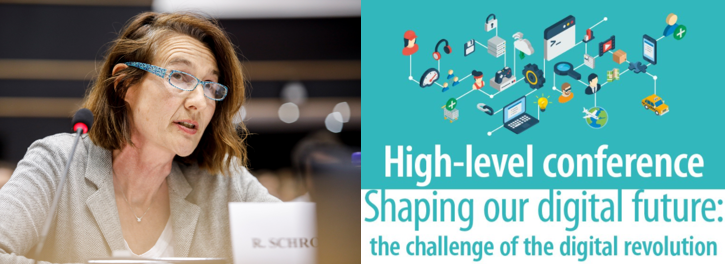EU conference on digital sector: policymakers and citizens join forces to shape digital future

A High Level Conference “Shaping our digital future” brought together around 600 participants including MEPs, ministers and citizens to discuss challenges and opportunities of the digital sector on 25 April in Brussels.
The event was jointly organised by the European Parliament and the European Commission in the light of the rapidly changing digital landscape to enter into a dialogue with policy makers and citizens about Europe’s digital future. Four panels discussed the following topics:
- Investing in connectivity and the data economy infrastructure (5G, High Performance Computing, Artificial Intelligence) and avoiding a digital divide
- Innovation in the digital age based on better access, use and re-use of data
- Advantages, challenges and opportunities for people using digital services and how to best maintain their trust
- A digital single market for European businesses to operate across the EU in a fair environment without barriers
Antonio Tajani, President of the European Parliament opened the conference with a speech underlining the importance of legislation regarding the digital sector on a European level in the wake of the Cambridge Analytica scandal. He pointed out the threat of disinformation for democracies and the need to balance between freedom and responsibility and take action at EU level.
French Secretary of State in charge of Digital Affairs, Mounir Mahjoubi, stressed authorities must defend European values when working together with IT platforms to secure citizens’ privacy.
Mariya Gabriel, European Commissioner for Digital Economy and Society, emphasised the importance of quality press in Europe. She expressed the committment of all EU institutions in protecting citizens’ rights privacy online and ensuring the best opportunities for European citizens. Mariya Gabriel presented the EU Communication on “tackling online disinformation” on 26 April 2018 to call on member states for significant financial support for independent news media, fact- and source-checking, and media and information literacy.
Today we can count w/ a solid & clear definition & ambitious timeline for #OnlineDisinformation enabling adoption of concrete actions to counter it: A #CodeofPractice, a network of #FactCheckers #MediaLiteracy #QualityJournalism & #EUvalues are the pillars of our Communication pic.twitter.com/t3mwqxXW7K
— Mariya Gabriel (@GabrielMariya) April 26, 2018
Renate Schroeder, director of the European Federation of Journalists (EFJ), spoke on a panel about ‘Opportunities and Risks in a Digital Society’ which addressed the issue of trust online and how to guarantee security and respect for the privacy of European citizens. She referred to the final report of the EU high level expert group on fake news and online disinformation to regain trust in digital media.
Additionally, she said:
Investment in ethical, investigative journalism is needed. Funding for public and private media is crucial to build trust in the digital sector. A generation of journalists and editors must be trained to acquire skills for the digital future. The EFJ does not believe in “credibility indexes” but rather in the promotion of more objective criteria like ‘source transparency indicators’.
Critical, digital media literacy is urgent including training and guidelines on how to react to hate speech, how to deal with the audiences and how to include marginalised communities.
Artificial Intelligence will affect news in the years to come but humans, professional journalists, need to keep the control.
A Communication about Artificial Intelligence (AI) published by the European Commission on 25 April 2018 addresses the technological, ethical, legal and socio-economic challenges regarding AI for Europe.
.@renatemargot"press councils should create an ethical check list for automated content. Humans need to keep control over artificial intelligence. #EUdigital
— EFJ (@EFJEUROPE) April 25, 2018
Photo Credit: European Parliament Audiovisual Service / Pablo Garrigos











